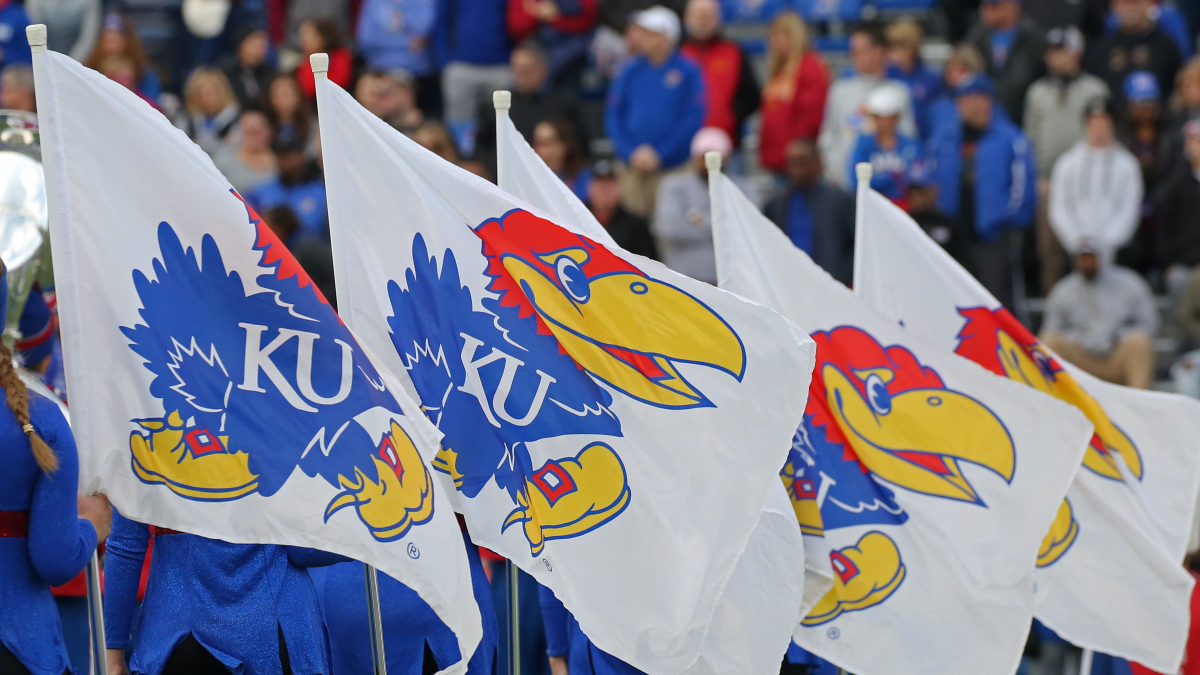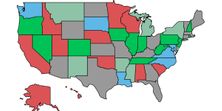Kansas Casinos, Lottery Retailers Continue Sports Betting Tug-of-War
Scott Winters/Icon Sportswire via Getty Images. Pictured: University of Kansas flags.
Kansas’ top gaming stakeholders all want legal sports betting. Two competing bills will determine which entities can accept bets — and if legal betting will come to Kansas this year.
Kansas’ four casinos oppose a House bill discussed this week that would allow the state lottery to open an online sportsbook and accept retail bets at hundreds of retailers across the state. The bill would also allow casinos to take sports bets, but the four casinos consider the more expansive House proposal an unnecessarily large gaming expansion.
More subtly, they see several hundred convenience store sportsbooks as a revenue threat in what is already a low-margin industry.
Casino stakeholders backed a competing Senate bill at a hearing last week that was an inverse of Thursday’s House discussion. The Senate proposal would prohibit lottery retailers from taking bets, and instead would limit online and retail sportsbooks to the four casinos.
Not surprisingly, state lottery retailer officials testified in support of the House bill and against the Senate bill.
This dichotomy cemented battle lines between the two stakeholder groups. Officials must find a solution or sports betting will remain illegal.
Casinos Back Senate Bill
To work around the state constitution’s gambling restrictions, the four casinos were placed under the state lottery’s purview, an unusual arrangement where the lottery oversees the quartet and operating licenses are contracted out to third parties. Casino companies or their subsidiaries own these establishments in most other commercial gaming states.
The four third-party casino operators are championing the Senate bill. Penn National’s Hollywood Casino at Kansas Speedway, located adjacent to the motorsports track in the heavily-populated Kansas City Metropolitan Area, would arguably be the biggest beneficiary for in-person sports betting under the Senate bill.
FanDuel, DraftKings and BetMGM also support the Senate bill, which would allow as many as 12 online licenses, three each for the four casinos. PointsBet already has a market access deal with Kansas Crossing Casino to accept wagers if sports betting is legalized, and many other top sportsbooks would likely be interested in the Kansas market.
The House bill’s proponents want the Kansas Lottery to be able to run online sportsbooks independent of and in addition to the third-part casino operators and their sportsbook company partners. This could limit the number of online licenses proposed in the Senate bill, and sportsbook operators fear this would give the lottery’s preferred partner a sizable advantage over those contracted out to the casinos.
The House bill also would allow as many as 1,200 Brick-and-mortar lottery retailers, most of which are convenience stores that could open retail betting kiosks. No other state allows such widespread in-person betting options, a point opponents stressed during written testimony submitted ahead of Thursday's House bill hearing.
Sportsbook operators also favor the Senate bill’s 8% tax gross gaming revenue tax on mobile wagers and 5.5% tax on retail wagers over the House’s 20% mobile and 14% retail rates. The Senate bill calls for some of the nation’s lowest tax rates while the House bill would be among the highest; the median tax rate in the roughly 20 states with legal betting is around 10 percent of revenues.
Proponents of the higher rates argue it would generate more tax revenue for the same. Opponents say it will decimate profits in a low-margin industry and dissuade would-be legal participants from entering the market.
Lottery Retailers, Horse Tracks Turn to House
The state’s shuttered horse tracks would also be able to open online and retail sportsbooks under the House bill. Officials from Ruffin Companies, which owns several Kansas tracks, testified that legal sportsbooks could help the tracks reopen, spurring millions in new revenues and thousands of new jobs. Ruffin Companies’ Phil Ruffin also owns several Las Vegas casinos including Trump International, which he co-owns with former President Donald Trump.
House bill backers including Federal and State Affairs Committee Chair John Barker argue the bill allows a more equitable allocation for legal wagering. Barker has served in the House since 2013 and as chair of the committee has considerable influence over the sports betting bill’s passage.
What Comes Next
Both bills remain in their respective Federal and State Affairs committees. Committee members could vote on one or both in the coming weeks.
In the meantime, the two disparate gaming interests will try to push lawmakers toward their bill and away from its opponent.
Democratic policymakers, including Gov. Laura Kelly, largely support the concept of legal sports betting. So too do many top Republicans in both the House and Senate, which is far more significant for the legislation’s hopes in the GOP-controlled legislature.
But lawmakers from both parties are split between which entities could take bets, a division reiterated by this week’s House bill hearings and last week’s Senate hearings. Stakeholders and elected officials must now figure out some path forward between the competing visions or any further legislative action will meet a dead end.
How would you rate this article?

